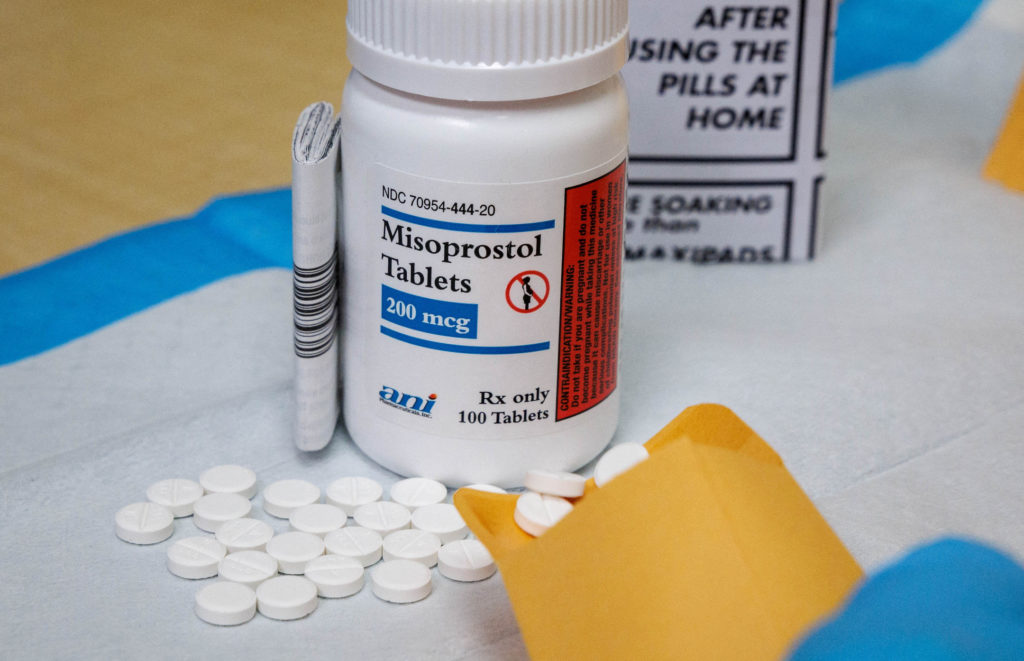MISOPROSTOL.
Misoprostol is a medication used for various medical purposes, including medical abortion. Here are some key points to consider:
- Medical Abortion: Medical abortion, also known as medication abortion or non-surgical abortion, involves using medications to terminate a pregnancy. Misoprostol is one of the medications used in combination with another medication called mifepristone or sometimes used alone in specific circumstances.
- Mechanism of Action: Misoprostol is a prostaglandin analogue that helps induce contractions of the uterus, leading to the expulsion of the pregnancy. It is typically used after mifepristone to initiate the process of abortion.
- Effectiveness: When used as directed and under medical supervision, the combination of mifepristone and misoprostol is highly effective for ending early pregnancies. Success rates vary depending on factors such as gestational age, dosage, and individual response. The effectiveness can range from 92% to 98%, making it a safe and reliable method for pregnancy termination.
- Timing and Administration: The timing and administration of misoprostol can vary based on medical protocols and regional guidelines. Typically, it is taken 24 to 48 hours after taking mifepristone. The medication can be administered orally or placed in the vagina. The specific dosage and instructions are provided by healthcare professionals.
- Side Effects and Complications: Like any medication, misoprostol can have side effects. These can include abdominal cramping, bleeding, nausea, vomiting, diarrhea, and fatigue. The intensity and duration of these side effects can vary among individuals. Serious complications from medical abortion with misoprostol are rare but can include excessive bleeding, infection, incomplete abortion, or an ongoing viable pregnancy. Seeking medical attention and follow-up care is important to ensure safety and address any concerns.

MIFEPRISTONE
Mifepristone is another medication used in medical abortion, often in combination with misoprostol. Here are some key points about mifepristone:
- Medical Abortion: Mifepristone, also known as the abortion pill or RU-486, is used in medical abortion to terminate early pregnancies. It works by blocking the hormone progesterone, which is necessary for maintaining a pregnancy.
- Mechanism of Action: Mifepristone acts by inhibiting the action of progesterone, leading to changes in the lining of the uterus and separation of the embryo from the uterine wall. This makes it easier for the uterus to contract and expel the pregnancy.
- Administration: Mifepristone is typically taken orally under medical supervision. The specific dosage and instructions may vary depending on medical protocols and regional guidelines.
- Timing and Combination with Misoprostol: Misoprostol is often used in combination with mifepristone to complete the medical abortion process. Mifepristone is usually taken first, followed by misoprostol after a specific interval. The misoprostol helps to induce contractions and expel the pregnancy from the uterus.
- Effectiveness: When used in combination with misoprostol, mifepristone is highly effective for ending early pregnancies. The success rates for medical abortion with mifepristone and misoprostol range from 92% to 98%, depending on factors such as gestational age and individual response.
- Side Effects and Complications: Like any medication, mifepristone can have side effects. Common side effects may include abdominal cramping, bleeding, nausea, vomiting, headache, and fatigue. Serious complications are rare but can include excessive bleeding, infection, incomplete abortion, or an ongoing viable pregnancy. It’s important to seek medical attention and follow-up care to ensure safety and address any concerns.
It’s essential to consult with a qualified healthcare provider who can provide accurate information, guidance, and support throughout the process of medical abortion with mifepristone. They can provide you with specific instructions, answer your questions, and monitor your progress to ensure a safe and effective abortion process.

Can You Use Misoprostol Alone Without Mifepristone?
Yes, in certain situations, misoprostol can be used alone for pregnancy termination, particularly in cases where mifepristone is not available or contraindicated. The effectiveness of misoprostol alone for abortion varies depending on factors such as gestational age and dosage.
When used as a standalone medication, misoprostol is typically administered either orally or vaginally. The specific dosage and administration method may vary depending on regional guidelines and healthcare provider recommendations.
It’s important to note that the effectiveness of misoprostol alone may be lower compared to using it in combination with mifepristone. The combination of mifepristone and misoprostol has been found to have higher success rates and a shorter time to completion of the abortion process. However, misoprostol alone can still be a viable option in certain situations, especially in regions or circumstances where mifepristone is not available.
If you are considering using misoprostol alone for abortion, it’s crucial to consult with a qualified healthcare provider who can provide you with accurate information, guidance, and support. They can provide you with the appropriate dosage, administration instructions, and monitor your progress to ensure a safe and effective abortion process.
Statistically what are the chances of failure?
The effectiveness of medical abortion using misoprostol can vary depending on factors such as gestational age, dosage, and individual response. It’s important to note that the statistical chances of failure can be influenced by various factors and may differ from one study to another. However, I can provide you with a general overview based on available data:
- Early Pregnancy: Medical abortion using misoprostol is most effective during the early stages of pregnancy. In pregnancies up to 7 weeks gestation, the success rates are generally higher, ranging from approximately 92% to 98%.
- Gestational Age: As the pregnancy advances, the effectiveness of medical abortion with misoprostol alone may decrease. For pregnancies beyond 7 weeks gestation, the success rates may vary and tend to be lower compared to earlier gestational ages.
- Dosage and Administration: The specific dosage and administration method of misoprostol can also influence the effectiveness of the procedure. Healthcare providers typically prescribe specific protocols and guidelines to optimize the success rates.
- Follow-up Care: It’s important to follow up with a healthcare provider after using misoprostol for abortion to ensure the completion of the procedure. Follow-up care can include confirming the successful termination of the pregnancy through clinical evaluation, ultrasound, or blood tests.
- Individual Variability: It’s important to remember that individual responses to medication can vary, and there can be factors that impact the outcome. The effectiveness of misoprostol alone may be influenced by factors such as individual physiology, adherence to instructions, and access to proper medical care.
To get accurate and personalized information about the effectiveness of medical abortion using misoprostol, it’s best to consult with a qualified healthcare provider. They can assess your specific circumstances, provide appropriate guidance, and address any concerns you may have.
In What Situation Is Mifepristone Contraindicated?
Mifepristone may be contraindicated or not recommended in certain situations. Contraindications are specific medical conditions or circumstances in which the use of a particular medication is not advisable due to potential risks or lack of safety data. Here are some situations where mifepristone may be contraindicated or not recommended:
- Ectopic Pregnancy: Mifepristone is not effective in terminating ectopic pregnancies, where the fertilized egg implants outside the uterus, typically in the fallopian tubes. In such cases, surgical intervention is usually required.
- Allergy or Sensitivity: Individuals with a known allergy or hypersensitivity to mifepristone or any of its components should not use the medication.
- Chronic Adrenal Failure: Mifepristone can interfere with the action of corticosteroids, which are crucial for individuals with chronic adrenal failure. Therefore, it is contraindicated in people with this condition.
- Inherited Porphyria: Mifepristone can potentially trigger acute attacks in individuals with certain types of inherited porphyria, a group of rare disorders affecting the production of heme.
- Long-term Glucocorticoid Therapy: Mifepristone can affect the action of glucocorticoids, which are commonly used in the treatment of various medical conditions. Therefore, caution should be exercised in individuals receiving long-term glucocorticoid therapy.
It’s important to note that this is not an exhaustive list, and there may be other specific medical conditions or individual circumstances that warrant caution or contraindication for the use of mifepristone. It’s crucial to consult with a qualified healthcare provider who can evaluate your medical history and provide personalized advice on the suitability of mifepristone for your situation.




